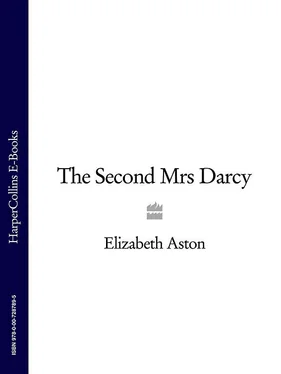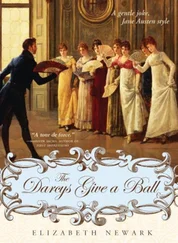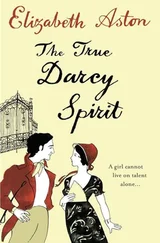They were eye to eye in height, and he was a grave man, but with a sense of humour that Octavia appreciated. A week after they had met, and a week before he was due to sail, he had proposed, and Octavia, liking him, if not swept off her feet, had accepted.
It had been the talk of the town: all the young ladies and their mothers or aunts or cousins had had their eye on Captain Darcy.
“He is very well connected,” Harriet had said. “Of an excellent family. The Darcys are very rich; his cousin, Fitzwilliam Darcy, is Mr. Darcy of Pemberley, you know.”
“Christopher Darcy has a neat estate in Wiltshire,” Mr. Thurloe added.
“He is a widower,” Harriet told Octavia. “His first wife was a great beauty, and the granddaughter of an earl. He was heartbroken when she died. It was an accident of some kind, I seem to remember, her horse bolted, and she was thrown. Or did her carriage overturn? I can’t exactly remember. That was five years or so ago, and people said he was so grief-stricken he would never marry again. However, once a man has had a wife, I find he likes to have another, so I’m not surprised that he wishes to marry again. Although …”
She didn’t finish the sentence, but Octavia knew what she was thinking. Why should a well-bred, well-off man, formerly married to the descendant of earls, pick Octavia for his second wife?
Captain Darcy told her why. “You laugh a lot,” he said, after giving her an affectionate kiss. “You have a smile on your lips, and your eyes dance. We naval men have a hard time of it at sea, and it will be a joy to come home to a warm smile and laughter.”
In the brief time they had together, it had been a happy marriage. He wanted a son, he made no bones about that, but he was kind and considerate when she lost a child early on, more concerned for her than for the loss of his hopes. “It’s difficult in this climate,” he said, having decided to leave her in Calcutta with Harriet while he was on his commission. “Plenty of time yet.”
Only he hadn’t had time. A keen botanist, he had taken the opportunity on his next visit to Calcutta to go up country with a naval friend. There, he had been bitten by an insect, a poisonous insect, and had, so the stricken lieutenant reported on his return to Calcutta, died soon afterwards.
Lady Brierley rose to take her leave. “You must take care of yourself, my dear, and if there is anything we can do—the Admiral was an old friend of Captain Darcy, as you know; they served together in the war on several occasions, and we in the service do not forget the families of our fellow officers.”
Octavia was touched by her kindness, and indeed by the kindness of her cousins, the Thurloes, who had taken her back into their household and were concerned for her future.
“It is all round Calcutta,” Harriet exclaimed, when she came in from a drive out to Tollygunge.
“What is?” said Octavia, helping her cousin with the ribbons of her straw hat. “You have just missed Lady Brierley.”
“No doubt calling to find out if it is true that you are penniless, thanks to that dreadful entail! To think of George Warren inheriting!”
“Not quite penniless.”
“As good as.”
The Thurloes returned to the subject of Octavia’s fortune that evening at dinner. Octavia, feeling hot in her black dress, although it was made of muslin, fanned herself vigorously. She wished that the punkah wallah , sitting peacefully in his corner and working the overhead fan by means of a string attached at one end to his big toe and at the other, via some pulleys, to the centre of the revolving wings, were more energetic in his task.
Although why should he be? It was one of the unexpected pleasures of India, she had found: the contrast between the cool mornings, the time for brisk exercise, for riding and for clear thinking, and the languorous heat of the day, giving way to the ease of the evening.
The weather was cooler now, in September, with the hot season and the rains over; the monsoon had come late that year, meaning that the baking sultry days of the early summer months had seemed to go on for ever, finally breaking in a stupendous thunderstorm which sent sheets of water on to the dusty streets, transformed in a flash into foaming streams and even rivers, causing many of the inhabitants to be virtual prisoners in their houses until the floods subsided, leaving a muddy, stinking detritus beneath still-brooding skies.
Octavia loved the drama of the weather, she loved the energy and vitality of a city thronged with people, mostly desperately impoverished, but still loud with talk and colour and life. How dull distant England seemed, although she knew that the Thurloes were endlessly homesick for green fields and hedges, for villages with church spires, for the mists of autumn mornings when the huntsman’s horn rang out over the fields.
“Or London, how much I envy you returning to London!” said Harriet. “And you will be pleased to see your brothers and sisters again,” she added, without conviction, having a very good notion of just how pleased they would be to have Octavia turning up on their doorstep again.
“It is such a pity that Darcy’s heir should turn out to be George Warren,” Robert Thurloe said, not for the first time, as he ate a mango and then dipped his fingers into the water bowl. “No one, except his mother and the Prince Regent, with whom he is on very good terms, one understands, has a good word to say for the fellow. My advice, Octavia, if you decide to return to England, is to write to Mr. Darcy, Mr. Darcy of Pemberley, in Derbyshire. He is not a close connection of your late husband’s, but he is a man of considerable wealth and influence. He has a fine estate, and has done very well out of mineral rights, I understand. He may be able to advise you as to the best course with regard to approaching George Warren.”
Octavia had no intention of contacting any of her Darcy connections, however rich and influential. She suspected that their reaction to the arrival of an impecunious widow, even one bearing their name, would be much the same as that of her own family. They would compare her unfavourably with that paragon of breeding and beauty, the rich, aristocratic first Mrs. Darcy, whose memory had haunted her marriage. And from all she had heard of George Warren, the chances of his providing for her in any way seemed remote; he was not that kind of a man.
The lawyer in Calcutta who had laid out for her just how Captain Darcy’s affairs were arranged had expressed his own doubts about Mr. Warren in no uncertain terms. Mr. Dyer was a small man with round, red cheeks, which he blew out in a disparaging way when the subject of George Warren came up. “Mr. Warren has a reputation for doing nothing which is not of immediate benefit to himself. You must make the attempt, of course, I would not advise otherwise, but you should not hang any great hopes on a favourable outcome.”
Well, she, Octavia, wasn’t going to go cap in hand to any George Warren. She would ask Christopher’s lawyers in London to write to him, and if, as she expected, the answer was a flat refusal, then she would take it no further.
“Have you made up your mind when you will return to London?” Harriet enquired, as she and Octavia left the table and went to sit on the verandah.
Octavia listened to the sounds of an Indian night, the yelps and yowls of the pi dogs, the unearthly howls of the hyenas, a baby in a neighbouring house crying, then being hushed, the hoot of an owl, that harbinger of doom, according to the Indian servants, although Octavia liked those big birds of the night, with their huge, unblinking eyes and feathered wings. She didn’t care so much for the bats, visible against the last trails of yellow left from the abrupt tropical sunset, squeaking and flitting to and fro. And the frogs had started up in their steady nighttime chorus.
Читать дальше












